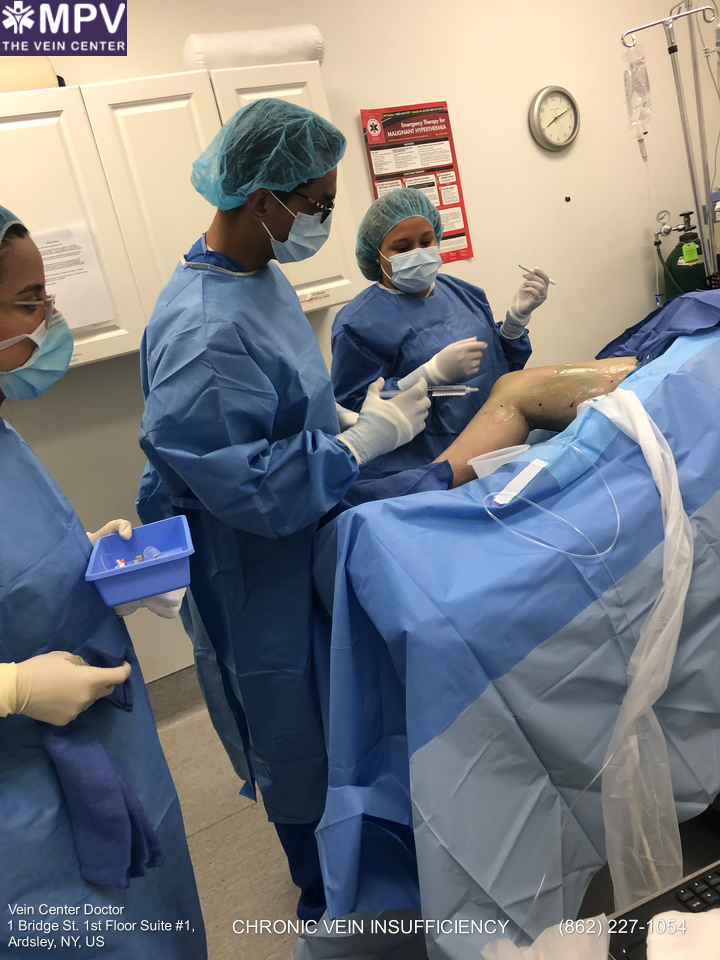Most women undergo hormone replacement therapy (HRT) once they start menopause and experience symptoms of declining estrogen. HRT provides patients with the needed hormones they've stopped producing. This reduces their menopausal symptoms, including hot flashes, vaginal dryness, bone loss, etc. However, most patients worry about its effects on the blood flow, causing chronic venous insufficiency (CVI) and other cardiovascular issues.
So does hormone replacement therapy cause chronic venous insufficiency? There isn't enough clinical evidence to prove that HRT can cause CVI and varicose veins, though it can increase your risks of developing the condition. HRT has been linked to the possibility of stroke and blood clots. Patients undergoing this medication have higher chances of developing deep vein thrombosis (DVT), which may result in CVI.
Living with unwanted veins is a thing of the past, when you can simply schedule a free consultation with Vein Center Doctor and find your ideal solution today.
To this day, there is still an ongoing series of clinical studies to back up claims of how the female hormones work, specifically as to how they can cause chronic venous insufficiency. However, one thing has been consistent in clinical trials about the cardiovascular system and hormone replacement therapy: it increases the risks of heart attack and blood clots, including those in the lungs and legs. Hormone replacement theory does not decrease the predisposition of women to developing heart diseases contrary to what was first believed–instead, it increases these risks.
As hormone replacement therapy increases the risks of blood clots, a study has also linked some types of estrogen medications to high risks of venous thromboembolism or blood clots forming in the veins. This includes a venous disease called deep vein thrombosis. This disease involves venous thrombosis, usually at the pelvis, thigh, or lower leg, which blocks the flow of blood to the heart. This disease is also one of the causes of chronic venous insufficiency.
Deep vein thrombosis can result in a more serious condition called pulmonary embolism, where the blood clot from the leg's deep veins travels and gets lodged in one of the arteries in the lungs.
Aside from hormone replacement theory, there are still many other factors causing deep vein thrombosis, chronic venous insufficiency, and other medical conditions concerning the cardiovascular system. These include age, family history, high blood pressure, and other lifestyle factors. As hormone replacement therapy increases the risks of developing deep vein thrombosis, it may also be a risk factor for patients to also develop chronic venous insufficiency.
Hormone replacement therapy may heighten patients' risk of blood clots, leading to chronic venous insufficiency. Despite the health risks, it's still being used by menopausal women today because of its benefits, such as reducing the possibility of colon cancer and osteoporosis.
Because of its effect on the blood vessel and blood flow, healthcare providers now develop strict guidelines in taking hormone replacement theory. We need a full understanding of how it works and connects to developing vascular disease.
Hormone replacement therapy is a series of medications that provide the body with female hormones. This has been the standard treatment for a menopausal woman to ease the effects of declining estrogen levels.
Some menopausal symptoms include hot flashes, night sweats, vaginal dryness, bone loss, and more. These medications restore the estrogen they've lost once their body stops its production.
Hormone replacement therapy has been effective in preventing bone loss, osteoporosis, hip fracture, and other medical conditions. Your health care provider will be more careful when prescribing hormone replacement therapies because of the risks that come with it. We have already mentioned the risk of heart disease, arterial disease, and other cardiovascular issues.
These risks will depend on the dose of medications, the type of hormone therapy, its duration, and medical history. Doctors ensure that their patients will gain more of its benefits than its risks with a series of tests, followed by regular reevaluation. Because of this, patients needing hormone replacement therapy must consult their doctor first to ensure they get tailor-fit medications.
The type of hormone replacement therapy patients will take will also affect their risk factors in developing a venous disease. There are many options available, but here are the main types:
The doctors usually prescribe estrogen with progestin or progesterone for patients who haven't undergone uterus removal. Taking only estrogen without balancing with progesterone may trigger the growth of the uterus lining, which will increase the risks of endometrial cancer. Those who had their uterus removed would be fine without progestin.
A woman's production of estrogen and progestin declines as they age, as menopause signals the start of their transition to the next phase. Because of these hormonal changes, patients experience menopause symptoms such as the following:
The right menopausal hormone therapy will relieve these symptoms and make the transition more comfortable for women. Aside from their risks, these medications also have benefits:
While hormone replacement therapy sure has benefits, it also has risks. Because of this, patients should consult their health care provider first before taking any medications. Here are some of its risks:
Consulting a reliable doctor will reduce your risks while taking hormone replacement therapy.
Chronic venous insufficiency is a venous disease where the blood collects in your leg vein, unable to return to the heart due to faulty venous valves or walls. Instead of flowing to the heart, the blood just flows back through the damaged valves again and pools in the veins. The blood pressure in your veins remains elevated. Here are some of the causes of CVI:
Sometimes, the cause of CVI is unknown. Patients with this condition have swollen legs and skin discoloration. It's also considered a post-thrombotic syndrome from DVT.
Hormones affect our entire body, so they will affect our veins as well. Hormonal changes can cause vascular problems. Once your hormones decline, like progestin, your vein walls will relax, allowing more blood to flow and pool inside it. This can cause varicose veins as the blood continues to pool and applies pressure on the valves of your veins.
As hormonal imbalances are connected to varicose veins, taking hormone replacement medications heightens the risks of CVI and varicose veins. However, the same goes with those in their pre-menopausal stage: it starts to become more difficult for the liver to absorb and break down estrogen out of the body, so there will be a build-up leading to weight gain and irregular blood flow. This can lead to varicose veins.
Hormone replacement therapy heightens the risk of blood clotting, which also increases the risks of deep vein thrombosis leading to chronic vein insufficiency. Oral medications of hormone replacement cause more of these risks than vaginal preparations, rings, or creams because the estrogen is processed in the liver. Once the liver processes estrogen, it increases as well its production of blood-clotting factors.

Some patients still need to take hormone replacement medications to ease menopausal symptoms. They can reduce the risks that come with the treatment by consulting their doctor, ensuring they're a candidate, minimizing their medications, doing regular check-ups, and leading a healthy lifestyle.
Your doctor will offer you tailor-fit treatment based on your hormone levels, medical history, and more. They will give you the accurate dose and type of medication that will have more benefits than risks for your health.
As HRT also comes with risks, doctors strictly screen candidates who can undergo the treatment. Patients qualified as candidates for the medications are the following:
This should be done in close coordination with the patient as they will still decide on their preferences. Patients not qualified are those with a medical history of the following:
Those trying to get pregnant aren't also recommended to take this medication.
We mentioned that your doctor would likely prescribe you the lowest dose in the shortest time for your menopausal symptoms. Patients with lasting symptoms that may affect their quality of life may need long-term use.
There is a fine line between hormone levels that are healthy and bad for your health--regular check-ups allow you to keep track of this and ensure that the treatment is still beneficial for you.
Treatments and supplements will only do half of the job--a healthy lifestyle will still go a long way. Exercise regularly and eat a healthy diet. Avoid unhealthy habits and keep track of chronic health conditions, like high blood pressure or high cholesterol.
Hormone replacement therapy isn't the only factor that will heighten your risk of having CVI. Ensure eating a balanced diet, avoiding smoking and wearing restrictive clothing, exercising regularly, and taking sitting or standing breaks. Keep track of your weight, too.
Eat a balanced diet and increase the consumption of food that is good for your blood circulation. Avoid salty food, which makes your body retain water. Excess fluid from this diet can make your legs swell and put more pressure on your leg veins. This will then weaken your veins, leading to CVI.
Avoid shoes or clothing that can restrict blood flow in your legs, such as high heels and tight belts. These can be in the way of your blood returning to the heart.
Staying active helps improve your circulation and tones your leg muscles, which will aid blood to flow back to the heart. You can go on regular walks, ride a bicycle or jog even for just 30 minutes several times a week. Stretching your thigh and calf muscles will also help.
Obesity increases your risk of having chronic venous insufficiency as the mass blocks or weakens the valves in your leg veins. Patients must seek help for the right diet and exercise program.
Those sitting or standing for long periods have a high risk of having chronic venous insufficiency as the blood collects in their leg veins. If your job requires you to stand or sit for long, ensure taking breaks where you move your legs to help the blood flow to your heart. Avoid crossing your legs and always elevate them to ensure blood flow.
Wearing compression stockings aids the blood to flow toward the heart. Consult your doctor for the right compression stockings for you.

Hormone replacement therapy may have risks, but it remains a necessity for some women. Just as it has risks of blood clots, it also has other benefits that will improve a patient's quality of life. Those needing to take HRT must consult their doctor for the right medications, although it has risks of CVI and varicose veins.
Those needing their HRT but also worry about CVI and varicose veins should also seek a reliable healthcare provider to address this, such as Vein Center Doctor. We specialize in treating varicose veins, spider veins, venous insufficiency, and others. Book your free consultation today.
Find exactly what you need to get rid of your vein-related problems. Dr. Sood and the rest of our team at Vein Center Doctor are ready to help: schedule your free consultation today.
Most Insurance is accepted for treatment